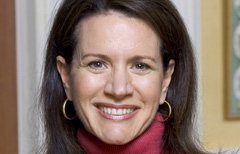Susie Essman talks “Curb Your Enthusiasm” and the influence of her Jewish background
Permanent link All Posts
Comedian Susie Essman has been in the stand-up world for over two decades, first appearing on Comedy Central back in 1992. But Essman's greatest success has come from acting on HBO's hit show, Curb Your Enthusiasm. As Susie Greene, Essman entertains with witty, outrageous lines, most of which include expletives and none of which can be printed.
In addition to performing stand-up and acting on television, Essman has authored a book, entitled What Would Susie Say?: Bull**** Wisdom About Love, Life and Comedy.
Susie Essman will be the featured speaker at the JUF Suburban Professionals, Foods & Hospitality, High Tech and Wholesalers, Retailers & Manufacturers Divisions Dinner Wednesday, May 9 at the Westin Chicago North Shore in Wheeling. In advance of her speaking engagement, Essman sat down for a phone interview with Oy!Chicago.
Oy!Chicago: Your character on Curb Your Enthusiasm probably says more curse words than the average teenager. What's it like to play such an in-your-face, outspoken woman as Susie Greene?
Susie Essman: It's very cathartic. It's very, very therapeutic. It's some primal scream therapy… I don't really behave like that in real life, unless I'm pushed. It's really fun to play such an angry, over-the-top character… On a day that I have done a screaming or yelling scene, I always go back to the hotel [in L.A., where the show is filmed] and I'm so relaxed. My muscles are relaxed, because I vented. And no one gets hurt—that's the beauty of it. And I get paid.
I never thought that this is what my life would end up being, but so be it.
What's interesting about the show is that it's not quite scripted like most television shows. What's it like being on a show that is mostly improvised?
I love it. I love not having to memorize lines. It's not free-for-all improvisation—there's a very detailed outline. We know what each scene is about, what has happen to in each scene and where it's going. The only thing that's not written is the dialogue.
It's incredibly creative, fun and different. It's more like what my stand up is. I love it. We just really have as a blast. Larry [David] gets the giggles every time I scream at him, so he always ruins all my best takes.
How and when did you realize you would be well-suited for comedy?
I always wanted to be an actress, when I was a kid. I wanted to be a comedic actress. I wanted to be like Carol Burnett.
I never thought of doing stand-up. I never knew anything about it. It wasn't a world that I was familiar with. When I was in my mid-20s, my friends forced me to get on stage. I had never been in a comedy club… After a few times on stage, I realized it was what I was born to do.
So I came upon it accidentally. You can't make plans. My grandmother used to say, I think it was a Yiddish proverb, "You make plans, and God laughs."
Your grandparents were Jewish immigrants from Eastern Europe. How did that background affect your life, and has that also played out in any way in your comedy?
My paternal grandmother, Millie Essman, was the funniest person I knew. She had a typical immigrant story… she had a very hard life… But she was always funny. She saw everything through the prism of humor.
In her final years, she was at a nursing home and had severe dementia, and she didn't know who I was… But I would go visit her, and the nurses would tell me that she kept them laughing all day long.
It was very poignant to me, because I felt like she had really lost everything—her memory, her dignity, everything was gone—except for her sense of humor. That was the one thing she held on to, until the day she died. That had a big influence on me.
What kind of a role does Judaism play in your life, both personally and professionally?
I wasn't raised religiously at all. But there is an incredible legacy of Jewish comedians in this country. The history of stand-up comedy, in particular, is very heavily Jewish. Those are the people that influenced me when I was starting. Growing up, what I heard in my house was Mel Brooks, Woody Allen, Alan King, so many great comedians that my parents loved…
I think there's something about Judaism itself that lends itself to comedy. The nature of it, to be a religious person, is to study and question… Comedians always look at everything and question it—they don't accept the status quo. So in Judaism, the way you become a learned religious person lends itself to a comedic brain.
A meaningful contribution to the 2012 Annual Campaign is required to attend. Registration for the event can be completed online at www.juf.org/professionals/tip_dinner.aspx. For more information regarding JUF's Trades, Industries and Professions Divisions, email tip@juf.org.



.jpg)



